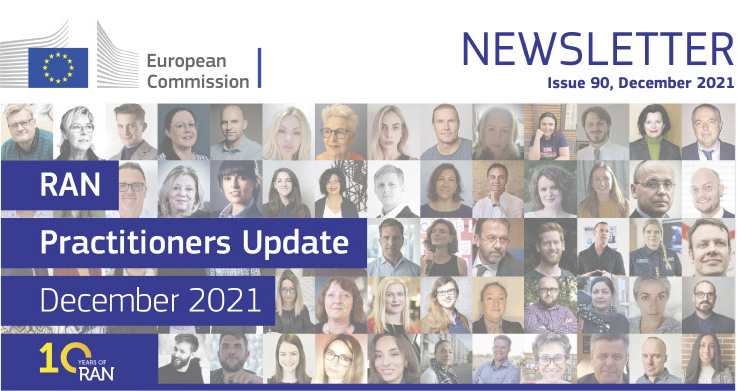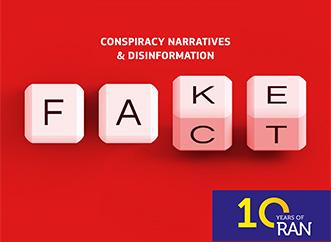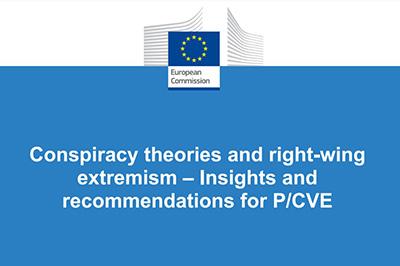
The COVID-19 pandemic has accelerated the propagation and proliferation of conspiracy narratives and disinformation at an ever-increasing pace. Where they were once thought to be confined to dark, hidden corners of the online space, COVID-19 has accelerated their mainstreaming into almost all areas of life. With the pathway between conspiracy narratives, disinformation and radicalisation already established, practitioners are having to work harder than ever to cut through the noise created by these narratives, which can be so appealing to communities who are increasingly finding it difficult to know what to believe.
This month’s update contains the latest RAN Practitioners Spotlight Magazine which focuses on the topic of conspiracy narratives and disinformation, with articles and interviews with practitioners working in this space. The Update also links to a new film which hears from academic experts, practitioners and Working Group Leads discussing conspiracy narratives and disinformation, as well as a newly released paper on the topic.
Conspiracy Narratives & Disinformation

Spotlight
The latest edition of the RAN Practitioners Spotlight magazine features a series of articles, case studies and interviews with practitioners and Working Group leads highlighting their work tackling the proliferation of conspiracy narratives and disinformation. The magazine assesses various aspects of the challenge, outlines the scale of the problem and the options that practitioners have in combatting it, and provides examples of what RAN and its network of practitioners are doing in this space.
Film - Conspiracy Narratives & Disinformation
This new film highlights the P/CVE challenge posed by conspiracy narratives and disinformation, as well as RAN Practitioner’s response. In the film we hear from academic experts in the field, as well as RAN Working Group Leads and Practitioners as they highlight the existing and emerging conspiracy narratives that we see in P/CVE practice, (from the New World Order to QAnon to COVID-19 conspiracy plots), the difference between them and less harmful conspiracy narratives, the increasingly mainstream nature of them, as well as the nuances between different types of disinformation and RAN’s attempts to tackle them.

Paper - Conspiracy narratives and right-wing extremism
A new paper highlights the proliferation of conspiracy narratives and their link to violent right-wing extremism. It highlights the archetypal narratives of conspiracy ideologies, providing ‘black and white’ world views and how they foster societal divisions between in-groups and out-groups by exacerbating intolerance against ‘the other’ and delegitimising different voices as being part of the conspiracy. The paper provides recommendations for practitioners in tackling the conspiratorial labyrinth of conspiracy narratives.
Upcoming Events
Due to the global COVID-19 pandemic, RAN Practitioners will continue to deliver the majority of meetings in the coming months online. For more information on planned meetings please go to the RAN website.
Publications
Focus on Children: The challenge to reflect on values with imprisoned extremist parents
A new paper that provides an overview of projects in Europe concentrating on parents in prison, their children or both. Most of the projects focus on strengthening parenting competence and encouraging bonds and communication between imprisoned parents and their children. Even though the authors’ work is primarily concerned with parents holding right-wing extremist attitudes, some of its elements are applicable to any form of extremism. Read more...
The role of psychotherapy in rehabilitation and exit work
This new paper highlights the growing focus on the intersection between mental health and the field of preventing and countering violent extremism (P/CVE). In the past, researchers tended toward the view that it was people with mental health illnesses or psychopathic tendencies who committed extremist acts. Scholars later eschewed these explanations in favour of the theory that radicalised individuals were rational actors in pursuit of specific objectives. Now, overwhelmingly, the current literature recognises that the pathways to radicalisation are complex, multifaceted and interconnected, and that there is no ‘single pathway’ to radicalisation. Read more...
Substance use and violent extremism
This new paper looks at the historical link between alcohol and drugs, and human violent behaviour. Despite the fact that many politically and religiously motivated extremist ideologies and groups promote purity of body and mind as an ideal, drug use and mind-altering substances have been widely reported in violent Islamist extremist (VIE) and violent right-wing extremist (VRWE) contexts. The objective of this paper is therefore to examine the ways in which drugs and alcohol form part of the wider social practices of different extremist groups and phenomena. The paper considers how drugs can be utilised for recruitment or radicalisation purposes, and specifically, how drugs are used to lower the threshold for committing extremist violence and/or terrorism. Read more...
National hubs supporting local actors in P/CVE - practitioners’ insights
A new paper that looks at the key role that local actors play in effective efforts to prevent and counter violent extremism. When it comes to addressing challenges of radicalisation and violent extremism, local municipalities and authorities together with and supported by national governments, often bear the primary responsibility. In past years, a variety of local approaches has emerged across Europe, each of them informed by different local settings, governance structures, resources and needs assessments and all of them guided by different national prevention strategies. Read more...
Contemporary Violent Leftwing and Anarchist Extremism (VLWAE) in the EU: Analysing Threats and Potential for P/CVE, November 2021
A new paper that looks at the complex, difficult issue of contemporary violent left-wing extremism. The complexity of the phenomenon starts with its definition, as happens for many other forms of extremism. The classification of violent manifestations in the left-wing extremist scene in the EU is highly controversial both in political circles and academic communities. Furthermore, the phenomenon has several ties with anarchist violent extremism, and, throughout history, the ideological spectrum of violent left-wing extremists was enlarged by the intersection of different ideologies like Marxism-Leninism, Trotskyism, Proletarian internationalism, Stalinism, Maoism, anti-militarism and eco-socialism. Read more...
Incels: A first scan of the phenomenon (in the EU) and its relevance and challenges for P/CVE
A new paper that intends to demystify key tenets of the incel ideology and its relationship to violence, outline key challenges for practitioners in prevention and countering of violent extremism (P/CVE) in reaching this community, and offer recommendations for intervention providers and practitioners to increase and improve work related to this phenomenon. Read more...
Returning to extremism: An overview of terrorist reoffending and current challenges
A new paper that aims to provide recommendations for practitioners working with violent extremist clients by discussing recidivism data, current challenges, risk and protective factors, and risk management strategies. Due to recent tragic terrorist attacks in Europe, the question of terrorist recidivism has come to the centre of attention in public and policy discourses. Although the data show low recidivism rates in European countries, the impact of successful re-offenses are enormous and prompts the revision of existing practices. Read more...
Extremists’ use of gaming (adjacent) platforms - Insights regarding primary and secondary prevention measures
This new paper discusses how traditional gaming (adjacent) platforms have contributed to extremist activities. Non-gaming platforms must be considered in addition to classic platforms focused on gaming. The paper also explores how extremist individuals and organisations make strategic and organic use of the platforms. The paper goes on to focus on opportunities for primary and secondary prevention on gaming (adjacent) platforms. As there is little experience of P/CVE measures on these platforms, the paper provides considerations and recommendations that should be taken into account when designing and implementing prevention efforts in these environments. Read more...
Contact us
RAN Practitioners is implemented by RadarEurope, which is a subsidiary of the RadarGroup:
- Phone: +31 (0)20 468 06 08 (office)
- E-Mail: ran
 radareurope [dot] nl (ran[at]radareurope[dot]nl)
radareurope [dot] nl (ran[at]radareurope[dot]nl)
Would you like more frequent updates on RAN’s activities? Gain access to all public RAN papers as they are published, other RAN news and thought-provoking articles on the radicalisation process by following RAN on:
